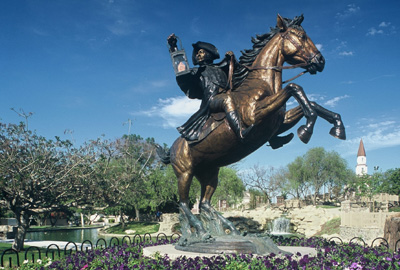
 The Fourth Amendment to the Constitution was included for a reason. It was included for a reason that was engrained in the reality of the Revolutionary Generation’s collective experience. During the American War for Independence, the British maintained a doctrine of “general warrant,” wherein British officers and government officials could search and seize a person and their property at-will. Such a practice practically made American Colonists the property of the state, and undermined the very individual rights the English Bill of Rights was supposed to enshrine. The framers of our Constitution, formerly British citizens themselves, were appalled that the British Crown would undermine the very constitution of their country, thus undermining their rights as British Citizens.
The Fourth Amendment to the Constitution was included for a reason. It was included for a reason that was engrained in the reality of the Revolutionary Generation’s collective experience. During the American War for Independence, the British maintained a doctrine of “general warrant,” wherein British officers and government officials could search and seize a person and their property at-will. Such a practice practically made American Colonists the property of the state, and undermined the very individual rights the English Bill of Rights was supposed to enshrine. The framers of our Constitution, formerly British citizens themselves, were appalled that the British Crown would undermine the very constitution of their country, thus undermining their rights as British Citizens.
Those same framers may rightly be appalled at the present actions of the government they founded.
The Constitution of the United States wasn’t so much of a “revolution” of political thought as it was a reaffirmation of the Natural Rights of all men and women. The founders of our nation weren’t trying to reinvent the wheel of human rights; they were, instead, reinventing the wheel of the political structure charged with preserving those rights. That’s why the Constitution provides for the separation of powers, checks and balances, and a clear-cut Bill of Rights that restrains the whole of government, not just certain departments, from trampling certain civil rights afforded all citizens of these United States. One of these enumerated rights was the right to be free from “unnecessary searches and seizures.” This, again, was a direct response to the British practice of “general warrant,” which had turned the British Commonwealth into a de facto police state.
The idea behind the Fourth Amendment was that no citizen would be subject to search or seizure by the government without probable cause, and that a specific warrant be presented to spell-out that cause. Thus, the idea of the search warrant, as opposed to the British notion of a general warrant, was born. This was a truly revolutionary notion, which secured human rights on a scale never before seen in Western Civilization. Now, in our own time, we are witnessing the erosion of this world-changing, revolutionary notion of individualism and personal privacy on a massive scale. In the name of combating the threat of terrorism, the Federal government is assuming powers our framers never intended it to possess. In the name of national security, our own government is undermining civil liberties. This was clearly demonstrated with the recently revealed actions of the National Security Agency (NSA).
I’m a firm believer that the threat of radical Islam, manifested in the barbaric and brutal actions of jihadists around the world, is real. I’m under no illusions that they seek our destruction only because of some foreign policy decision made by a previous president; this totalitarian ideology of hate opposes everything we stand for as a nation, and it is a real threat that must be confronted. Nevertheless, if we confront this threat by undermining our own way of life, our own civil liberties, it will be a hollow victory. That’s why I would argue that we need to continue to enhance our national security capabilities, and improve the inter-cooperation of agencies charged with protecting the homeland, without undermining the purpose of the Fourth Amendment.
Monitoring suspected terrorists plotting against the United States is a far cry from monitoring phone calls from a mother in Greenville to her daughter in Columbia. In the recent case of the NSA, it seems as if our own government is equally eyeing both. Monitor and disrupt terrorism, yes. But spy on American citizens on American soil in the name of protecting our Constitutional freedoms, not so fast.





Hilter’s rise to power was facilitated by an accommodating legislature that used communism, jews, gypsies other classes as the purported threat to their heimat (German word for Homeland) to pass legislation known as the Enabling Act. Read from Wikipedia about the Enabling Act of 1933.
http://en.wikipedia.org/wiki/Enabling_Act_of_1933
Pay close attention to the parts about the government’s authority to tap phone calls and search the mail.
Our version of an enabling act is called the US Patriot Act. It’s not just what is written in the law but how it is secretly being interpreted and implemented that we deserve to know.
http://www.nytimes.com/2011/09/22/us/politics/justice-dept-is-accused-of-misleading-public-on-patriot-act.html?_r=0
Thank God for patriots like Ed Snowdon who are willing to lay down their freedom, treasure and possibly their life to let us know just how little is left of the 4th Amendment.
Great title to your blog post. Too bad you didn’t mention the source of your knowledge about the NSA and my apology ahead of time if your blog was written before Ed Snowdon identified himself as the source.
Come to think of it, Revere has ridden again and his name is Snowdon.